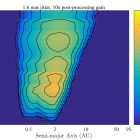Predicting the Unpredictable Analyzing the Science Yield of Exoplanet Imaging Mission Concepts
Abstract: In addition to multiple currently ongoing ground-based surveys, the projected capabilities of the James Webb Space Telescope, and the planned coronagraphic instrument for the Wide Field Infrared Survey Telescope, three of the four flagship-class missions currently being studied for the next decadal survey will have some exoplanet imaging capabilities. A key difficulty in designing these instruments is linking engineering design and operations decisions to the eventual mission science yield. As these future missions are explicitly intended to study exoplanets that current instrumentation is incapable of detecting, any attempt to characterize mission performance is entirely dependent on the assumptions made about the true (unknown) population of exoplanets. In this talk, I will discuss the constraints and observables of exoplanet imaging instruments and present two different techniques for assessing the impact of instrument design and operation on mission outcome. The first of these is detailed survey simulation ensembles designed to produce distributions of likely mission yields. The second technique, depth of search, involves attempting to explicitly separate instrumental effects from population assumptions. I will present results of applying these techniques to current mission concept studies and ground-based surveys, and also discuss how these analyses feed into the inference problem associated with analyzing the data from completed surveys.

